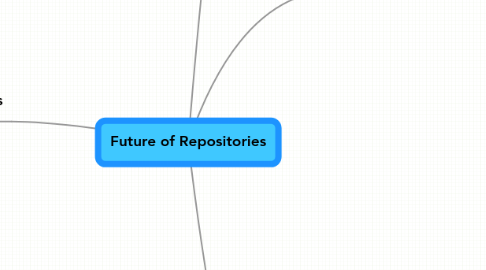
1. Group members
1.1. Bram Luyten (@mire)
1.2. Sarah Shreeves (U of Illinois)
1.3. Kathleen Shearer (COAR)
1.4. Kazu Yamaji (NII Japan)
1.5. David Corbly (U of Oklahoma)
1.6. Terrence Brady (Georgetown University)
1.7. Jyrki Ilva (Nat. Library of Finland)
2. Landscape & Horizon
2.1. ETDs
2.1.1. We've had success!
2.2. Globalization
2.2.1. 40% of CA researchers now working w international researchers
2.3. Open Data
2.3.1. Grassroots
2.3.2. Generational Change
2.4. Convergence between publishing & repositories
2.5. Lack of interest
2.5.1. Mandates are the stick, where's the carrot?
2.6. Interoperability
2.6.1. no more silos
2.7. Political
2.7.1. Office of science and technology Policy (OSTP)
2.7.1.1. ARL SHARE proposal competing with CHORUS
2.7.2. Global Research Council
2.7.2.1. presidents club of funding agencies
2.8. New Reward Systems
2.8.1. What can we replace impactfactor with?
3. Pioneering Examples
3.1. Liege Mandate
3.1.1. Great example of how policy is practically implemented with the ORBI repository
3.2. World Bank
3.2.1. Repository and Policy have shifted the publication office into the OA Future
3.3. Dryad
3.3.1. Non-institutional but subject based
3.3.2. Great example of PRE-Publication workflow
3.3.3. Identifiers of data in the publication, identifiers of publication in the data
3.4. DANS-Netherlands
3.4.1. 98% of our data in social sciences and humanities are below 1GB
3.4.2. Data deluge might not be that much of an immediate problem
3.5. CDL eScholarship
3.5.1. good integration with publishers
3.5.2. Great example of a consortial model
3.6. Difficult: Emergence of Commercial cris systems
3.6.1. Fragmented landscape, different vendors
3.6.2. Some vendors want the repository out of the picture
3.6.3. Because there are less federal reporting responsibilities in the US, CRIS is rising less
3.7. Federally funded institutions US
3.7.1. Institutions own the data
3.7.2. More problematic for other institutions: Who owns it? Researchers? Institution?
4. Future Gazing
4.1. Researchers
4.1.1. HAPPY
4.1.1.1. Offer added value
4.1.1.1.1. altmetrics
4.1.1.1.2. add social features
4.1.2. AWARE
4.1.3. ENTHUSIASTIC
4.2. Large Library Budget Shift
4.2.1. Tipping point is coming
4.2.2. Going from licensing content to more funds for repo services
4.2.3. Repo's and advocacy are underfunded right now we need more resources
4.3. What is the definition of the future repository?
4.3.1. Repo as infrastructre
4.3.1.1. Like electricity. People need to flip switches all over the place without knowing where the generator is
4.3.1.2. Hard to sell invisible infrastructure to funders
4.3.1.3. Knowledge Base, linking things together
4.3.1.3.1. Can the Repo be the hub?
4.3.2. Pedagogic Role
4.3.2.1. Undergrad research expositions (IDEALS)
4.3.2.1.1. students go back to others questions
4.3.2.1.2. reading eachothers work
4.3.2.2. Integrating with MOOCs, Moodle, ...
4.3.3. Repositories for Data
4.3.3.1. We need descriptive metadata for reuse
4.3.3.1.1. Moving from readme files to more structured
4.3.3.2. It's a separate process than gathering publications
4.3.3.2.1. more resource intensive
4.3.3.3. People need to deposit scripts and Software
4.3.3.4. What are national systems and other actors doing?
4.3.3.4.1. HPC guys only interested in their own (big) data
4.3.3.4.2. Finland CSC building national platform
4.4. Crowdsourced content
4.4.1. Civil war letters
4.4.1.1. University of Oklahoma example
